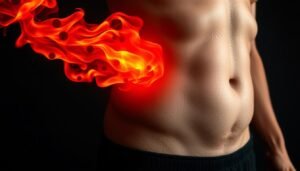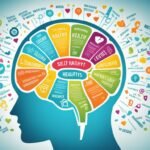Get our FREE E-Book HERE - 120 TIPS for Losing Weight & Bonus Tips for Postpartum Weight Loss & Dad’s Postpartum Experience
13 Weight Loss Myths Debunked by Science

Weight Loss Myths
When it comes to losing weight, there are a lot of myths and misconceptions out there. People try to lose weight, but they get stuck in a cycle of misinformation that makes it harder to reach their goals. This can lead to bad habits, unrealistic goals, and even disappointment. Plus, the spread of false information can damage the science of weight loss, casting doubt on what works and what doesn’t. To help people lose weight, it’s important to break down the myths and look at evidence-based approaches. In the next section, we’ll look at 13 of the most common weight loss myths and debunk them with scientific evidence. With the right info, anyone can start a healthy and successful weight loss journey.
Myth 1: All calories are equal

Scientific evidence suggests that not all calories are metabolized in the same way by the body, highlighting that the concept of “all calories are equal” may be outdated. The way the body processes calories is affected by various factors including the type of macronutrients consumed, the individual’s gut microbiome, and the composition of the diet.
Gut Microbiome’s Role:
A study cited by Harvard Health stated that the gut microbiome plays a significant role in how calories are processed in the body. In the study, two groups of individuals were offered meals with the same caloric content, but their bodies processed these calories differently due to variations in their gut microbiomes.
Macronutrient Composition:
A meta-analysis of 29 studies, found that individuals consuming the same number of calories but with different macronutrient compositions (low-carbohydrate diet vs low-fat diet) had variations in their total energy expenditure (1).
Another study from the Journal of the American Medical Association (JAMA) Network demonstrated that weight gain varied significantly when individuals consumed a high-fat diet compared to a mixed diet, despite the caloric intake being the same. This suggests that the type of macronutrients can indeed affect how calories are metabolized (2).
Type of Calories:
It’s argued that the type of calories consumed can affect the number of calories burned. For instance, low-fat, high-carbohydrate diets led to a different caloric burn rate compared to other diet compositions, as observed in certain studies (3)
A separate Harvard study highlighted that individuals on a low-carbohydrate diet burned between 209 and 278 more calories per day than those on a high-carbohydrate diet, reaffirming that all calories are not created equal (4).
These findings underline the complexity of caloric metabolism and demonstrate that the metabolic effects of calories can vary significantly based on a myriad of factors including the type of food consumed, the composition of the diet, and individual physiological differences.
Myth 2: Are you Obese? You are lacking willpower.

Obesity is largely influenced by biological factors rather than merely a lack of willpower.
Studies have highlighted the crucial role of genetics in obesity, with certain genetic causes leading to weight gain from early childhood. Individuals with a genetic predisposition to obesity often face higher hunger levels and may find traditional weight loss methods less effective, necessitating medical interventions for effective weight management (5).
Additionally, the development of new classes of diabetes and weight-loss drugs underlines the significant role of biology in determining an individual’s weight (6).
The multidimensional biological basics of obesity challenge the oversimplified notion that obesity being solely a matter of willpower.
Myth 3 : Eat less, move more
The conventional wisdom of “Eat less, move more” for weight loss has been challenged by numerous studies and experts, as it oversimplifies the complex nature of weight management and obesity. Here are several points based on scientific studies and expert opinions explaining why this mantra may not be effective:
The “Eat less, move more” advice doesn’t account for the complex interplay of genetic, hormonal, psychological, and environmental factors that contribute to an individual’s weight. This oversimplified advice may not work for everyone and can even be harmful by promoting a blame-oriented approach to weight management (11, 12).
Myth 4: Eating breakfast is necessary to lose weight

The notion that eating breakfast is essential for weight loss has been widely debated within the scientific community. Research has shown varying results, and there isn’t a one-size-fits-all answer as individual responses to eating or skipping breakfast can be quite diverse. Here’s what some of the studies and reviews say:
Meta-Analysis:
A meta-analysis of studies found a small difference in weight favoring participants who skipped breakfast, although there was inconsistency across trial results. The mean difference in weight was 0.44 kg, suggesting that skipping breakfast might have a slight advantage for weight loss in some cases (13).
No Association with Weight Loss:
It’s been stated that eating breakfast is not associated with eating less nor with weight loss, and the debate extends to whether skipping breakfast can help with weight loss(14). A 2019 research review analyzed 13 breakfast studies and concluded that eating a morning meal was not a reliable way to lose weight (15).
Individual Differences:
Another study published in the BMJ mentioned that eating breakfast does not increase weight loss when compared to individuals who did eat breakfast (16). This underscores the notion that the impact of breakfast on weight loss may significantly vary from individual to individual, possibly due to differences in metabolism, lifestyle, or other factors.
Also, another myth is that breakfast increases metabolism and that eating multiple small meals makes you burn more calories throughout the day (17).
Eat when you’re hungry and stop when you’re full. You can eat breakfast if you need to, but don’t expect that you will melt away the fat.
Myth 5: Detox Diets and Cleanses Are Necessary for Weight Loss
Detox diets and cleanses have been marketed as essential steps for weight loss and body purification. These diets often claim to eliminate “toxins” from the body, thereby promoting weight loss and improving overall health. However, the scientific community largely disputes these claims based on several key points:
Lack of Evidence:
There’s a substantial lack of evidence supporting the claims that detox diets and cleanses contribute to long-term weight loss. Various reviews and studies have found no evidence that detox diets lead to weight loss (18).
Temporary Weight Loss:
Any weight loss experienced during a detox or cleanse is often temporary. Detox diets can cause initial weight loss due to low calorie intake, but they tend to lead to weight gain once a normal diet is resumed, as these diets are not sustainable long-term (19).
Unnecessary for Health:
The body has its own efficient systems for detoxifying, mainly through the liver, kidneys, and digestive system. Therefore, detox diets and cleanses are not necessary for eliminating unwanted substances from the body (20).
No Significant Health Benefits:
Detox diets are deemed unnecessary and unlikely to benefit health in any significant way, and the claims of improved health and toxin removal are largely unsubstantiated by scientific evidence (21).
In conclusion, detox diets and cleanses are not a necessary or effective strategy for weight loss. They lack scientific backing, can lead to temporary weight loss followed by weight regain, and pose potential health risks. It’s advisable to adopt a balanced, nutritious diet and regular physical activity for sustainable weight loss and overall health improvement.
Myth 6: Dairy Products Cause Weight Gain

The relationship between dairy consumption and weight has been a topic of debate. Here’s a breakdown of the scientific evidence surrounding this myth:
No Direct Evidence of Weight Gain:
There is no evidence that dairy foods cause weight gain. Different types of dairy can have varying impacts on weight, and it’s possible to overeat less healthy types of dairy, which can lead to extra pounds. Some components in dairy like estrone and whey protein are believed by some researchers to potentially cause weight gain, while others posit that dairy calcium promotes weight loss. Overall dairy consumption has been associated with increased lean body mass and reduced body fat (22).
Beneficial Effects on Body Composition:
Evidence suggests that whole-fat dairy foods do not cause weight gain. In fact, overall dairy consumption, particularly yogurt and fermented dairy products, can increase lean body mass, reduce body fat, and may even reduce weight gain. Dairy, especially yogurt and probiotics, can have beneficial effects on body composition (23).
Mixed Results in Studies:
Some studies have shown mixed results regarding dairy’s effect on weight. For instance, a study assessed the associations between milk, dairy fat, dietary calcium, and weight change over time but did not conclusively tie dairy consumption to weight gain (24).
Meta-Analysis Findings:
A 2019 meta-analysis of 30 randomized controlled trials evaluated the effect of dairy food consumption on insulin resistance, body weight, and waist circumference. The authors concluded that dairy food consumption, especially low-fat dairy products, has a beneficial effect on these parameters (25).
No Long-term Benefits on Body Weight:
A meta-analysis found that while dairy foods were beneficial for body fat reduction in the short-term and when calories were restricted, no benefits on body weight were seen in the long-term when calories were not restricted (26).
In conclusion, the belief that dairy products inherently cause weight gain is not supported by scientific evidence. The impact of dairy on body weight and composition is complex and may vary depending on the type of dairy product consumed and individual factors. It’s advisable to consume dairy products as part of a balanced diet and in moderation.
Myth 7: Weight Loss Supplements Are a Safe and Effective Way to Lose Weight
The market is flooded with weight loss supplements claiming to aid quick and effective weight loss. However, the science backing these claims is often scant or non-existent. Here’s a breakdown of the scientific stance on the efficacy and safety of weight loss supplements:

Lack of Efficacy:
Multiple sources assert that there’s little scientific evidence supporting the efficacy of weight loss supplements. A recent study highlighted that individuals who took these supplements rarely experienced any significant weight loss (27). A systematic review also indicated that the evidence base for the efficacy of dietary supplements and alternative therapies for weight loss is limited (28).
Potential for Harm:
The U.S. Government Accountability Office stated that while little is known about the efficacy of weight loss supplements, some of them have been associated with the potential for physical harm (29). Moreover, some supplements can interact or interfere with medications, posing potential health risks (30).
Lack of Robust Scientific Evidence:
The scientific community calls for robust, randomized, placebo-controlled studies to provide clear-cut evidence regarding the efficacy and potential side effects of weight loss supplements. Such rigorous scientific evidence is currently lacking (31).
Expensive and Misleading:
Weight loss supplements can be expensive, and their labels can be misleading. The lack of regulation and oversight makes it difficult for consumers to know what they are actually getting.
Consult Healthcare Providers:
Due to the potential risks and the lack of evidence supporting the efficacy of weight loss supplements, it’s advisable to consult with healthcare providers before considering the use of any dietary supplement for weight loss (32).
The bottom line is that there’s a significant lack of scientific evidence supporting the claims made by weight loss supplements. The potential risks associated with their use make them a less advisable option for individuals seeking to lose weight. Instead, adopting a balanced diet and a regular exercise regimen are more reliable and safer approaches to achieving and maintaining a healthy weight.
Myth 8: You Should Cut Out All Snacks to Lose Weight
The idea that eliminating all snacks is essential for weight loss is quite common, but it’s not entirely accurate. The effectiveness of snacking or avoiding snacks largely depends on the individual’s total daily caloric intake, the type of snacks consumed, and the overall balance of their diet. Here’s a breakdown of the scientific understanding regarding this myth:
Caloric Intake:
Cutting out all snacks can help some people reduce their total caloric intake, which in turn can lead to weight loss. However, this isn’t a one-size-fits-all solution as it largely depends on one’s total daily caloric intake and expenditure (33).
Type of Snacks:
The type of snacks consumed plays a crucial role in their impact on weight. Healthy snacks can provide essential nutrients and energy, especially if there’s a long gap between meals. They can also help curb overeating at the next meal, which could be beneficial for weight management (34).

Individual Variability:
The effectiveness of snacking for weight loss can vary from person to person. For some, having healthy snacks can be a good strategy for weight loss, especially if the snacks are high in protein and fit well within their dietary regimen. For others, particularly those who struggle with portion control or who choose less nutritious snacks, avoiding snacking might be a better strategy (35).
In conclusion, the notion of cutting out all snacks to lose weight oversimplifies the complex nature of weight management. A more personalized approach, considering the individual’s lifestyle, dietary habits, and nutritional needs, would likely yield better and more sustainable results. It’s always advisable to consult with a healthcare professional or a registered dietitian to determine the most appropriate dietary strategies for weight loss.
Myth 9: Eating Small, Frequent Meals Boosts Your Metabolism
The idea that eating small, frequent meals throughout the day will boost metabolism and thereby aid in weight loss has been popularized over the years. However, scientific evidence supporting this notion is limited. Here’s a breakdown of the scientific understanding regarding this myth:
Limited Scientific Evidence:
There’s little scientific evidence to support the idea that eating small, frequent meals boosts metabolism. Advocates argue that this eating pattern can improve satiety, increase metabolism and body composition, prevent energy dips, stabilize blood sugar, and prevent overeating. Yet, the evidence backing these claims is not robust (36).
No Significant Metabolic Boost:
The claim that eating more frequently increases metabolism is not substantiated by scientific evidence. Spreading meals throughout the day might prevent excessive hunger and overeating, but it doesn’t necessarily boost metabolism (37, 38).
Observational Support:
Some observational studies suggest an inverse relationship between the frequency of eating and body fat, implying that eating more frequently could be associated with lower body fat. However, these findings are observational and do not establish a causal relationship (39).
Individual Variability:
The impact of meal frequency on metabolism and weight loss may vary from person to person. Some individuals might benefit from a more structured meal schedule, while others might find it easier to control their caloric intake with fewer meals (40).
In conclusion, the idea of boosting metabolism by eating small, frequent meals lacks strong scientific support. While some observational evidence suggests a potential benefit, more rigorous research is needed to substantiate these claims. Individuals looking to manage their weight should consider a dietary pattern that fits their personal preferences and lifestyle, possibly in consultation with a healthcare provider or a registered dietitian.
Myth 10: Drinking Water Before Meals is Irrelevant with Weight Loss
The idea of drinking water before meals to assist in weight loss is not just a myth, but a practice that has garnered some scientific backing. The principle behind this practice is that water consumption before meals can create a sense of fullness, which may help individuals eat less during the meal. Here’s a breakdown of the scientific understanding regarding this notion:

Supportive Evidence:
A study noted on PubMed highlighted that drinking 500 mL of water 30 minutes before each meal, in conjunction with a hypocaloric diet, led to greater weight loss in overweight or obese middle-aged and older adults. This practice was deemed a simple intervention with NHMRC Level 2 evidence of efficacy, and adverse effects were considered unlikely (41).
Randomized Controlled Trials (RCTs):
In one RCT conducted in Birmingham, England, the efficacy of water preloading before meals as a weight loss strategy was investigated among adults with obesity. The study found that this practice could indeed be beneficial for weight loss (42).
Another RCT directly examined the effects of water preloading before meals on weight loss among 48 adults with overweight or obesity. Individuals were allocated to a group that adhered to a hypocaloric diet plus 500 ml of water before meals every day or a group that followed a hypocaloric diet alone for 12 weeks. The results indicated that the group that consumed water before meals experienced more significant weight loss (43).
Additional Studies:
A separate 12-week study revealed that participants who drank 17 ounces (500 ml) of water before each meal lost 4.4 pounds (2 kg) more than those who did not adopt this practice. This finding further supports the idea that water consumption before meals can aid in weight loss (44).
The scientific evidence suggests that drinking water before meals can indeed be a helpful strategy for weight loss, particularly when paired with a hypocaloric diet. The sense of fullness induced by water consumption may lead to reduced food intake during meals, contributing to a caloric deficit and, subsequently, weight loss. This practice is also simple to implement and is associated with minimal to no adverse effects, making it a relatively easy and safe weight management strategy.
Myth 11: Exercise Alone is Enough for Weight Loss
The belief that exercise on its own is sufficient for weight loss is a common misconception. While exercise is an integral component of a healthy lifestyle and has numerous benefits, relying solely on exercise for weight loss may not yield the desired results. Here’s a breakdown of the scientific understanding regarding this myth:

Limited Efficacy for Weight Loss:
Exercise alone might not be as effective for weight loss as when it’s combined with a dietary intervention. Research suggests that diet plays a more significant role in weight loss compared to exercise alone. Over 85% of the reviewed weight loss interventions consisted of either diet alone or diet plus exercise interventions. It was observed that energy restriction through diet is often more effective for weight loss than exercise alone (45).
Caloric Balance:
The principle of weight loss revolves around creating a caloric deficit, i.e., burning more calories than are consumed. While exercise can help burn calories, if the caloric expenditure is not greater than the caloric intake, weight loss is unlikely to occur. Even when exercise energy expenditure is high, a healthy diet is still required for weight loss to occur in many people (46).
Plateau Effect:
There’s evidence suggesting that the number of calories burned may plateau after a certain amount of exercise, thus necessitating both a healthy diet plan and regular physical activity for a successful weight loss plan (47).
Overall Health Benefits:
While exercise alone might not be very effective for weight loss, it’s crucial for overall health. Exercise improves cardiovascular fitness, insulin sensitivity, glycemic control, blood pressure, and mental health, among other benefits. However, for weight loss, it’s often recommended to combine exercise with a healthy, calorie-controlled diet (48).
Observational vs. Controlled Trials:
Some of the beliefs regarding exercise and weight loss are based on observational research rather than randomized controlled trials, which are considered the gold standard of scientific evidence. Thus, while exercise has myriad health benefits, relying on it solely for weight loss might not be the most effective strategy (49).
In conclusion, exercise is a vital part of a healthy lifestyle and offers numerous health benefits. However, for effective and sustainable weight loss, it’s generally recommended to combine regular physical exercise with a balanced, calorie-controlled diet. This dual approach is more likely to create the necessary caloric deficit for weight loss and provide the nutritional support needed for overall health and wellbeing.
Myth 12: Eating Fat Makes You Fat
The belief that consuming fat will make one fat is a longstanding misconception stemming from the simplistic notion that dietary fat directly translates to body fat. While it’s true that fats are calorie-dense, providing 9 calories per gram compared to the 4 calories per gram provided by carbohydrates and protein, the claim that eating fat directly leads to fat gain is largely debunked by contemporary scientific understanding. Here’s a breakdown of the scientific perspective regarding this myth:

Essential Nutrient:
Dietary fats are an essential part of a healthy, well-balanced diet. They are crucial for many bodily functions including hormone production, cell structure, and the absorption of fat-soluble vitamins. However, not all fats are created equal. Some types of fats, particularly trans fats and excessive saturated fats, can contribute to obesity and other health issues, while unsaturated fats can be part of a healthy diet (50).
No Direct Correlation:
Over the past three decades in the US, the percentage of calories from fat in people’s diets has decreased, yet obesity rates have soared. Clinical trials have indicated that adhering to a low-fat diet doesn’t make losing weight any easier compared to following a moderate- or high-fat diet. This highlights that the relationship between dietary fat and body fat is not as straightforward as once believed (51).
Debunked Idea:
The idea that “eating more fat makes you fat” was ingrained in the 1970s but hasn’t stood the test of time. Modern nutritional understanding recognizes that the issue is more complex, with factors like total caloric intake, the source and type of fats, and individual metabolic responses playing significant roles in weight management (52).
Research Findings:
A study found that despite the logical assumption that a high-fat diet would lead to weight gain, this may not be the case. The findings suggest that it’s not the consumption of fat per se, but rather an excess of calories and the quality of the diet overall that are the primary drivers of weight gain (53).
In conclusion, the myth that eating fat leads to fat gain is a simplification of a much more complex metabolic reality. It’s not the consumption of fat, but rather the excess caloric intake and the quality of dietary choices, alongside other lifestyle factors, that significantly contribute to weight gain and obesity. A nuanced understanding of dietary fat and its role in a balanced diet is essential for making informed dietary choices for weight management and overall health.
Myth 13: Late-Night Eating Causes Weight Gain
The idea that eating late at night leads to weight gain has been a common belief. This notion is often rooted in the understanding that the body’s metabolism slows down at night, making it easier to store calories as fat. However, this myth is not entirely accurate, and the reality is more nuanced. Here’s a breakdown of the scientific understanding regarding this myth:

Caloric Intake vs Timing:
The primary factor in weight gain is an excess of caloric intake over caloric expenditure, regardless of the timing of food intake. If individuals consume more calories than they burn, weight gain is likely to occur. Eating at night only leads to weight gain if it contributes to a calorie surplus. It’s not the timing of the meal but the total caloric intake over time that matters (54).
Poorer Food Choices:
Some studies suggest that people may make poorer food choices at night or consume extra calories in the evening, leading to a higher daily caloric intake. This behavior, rather than the timing of eating per se, might contribute to weight gain (55).
Metabolic Changes:
There is some evidence suggesting that the timing of meals could affect metabolism. For instance, eating when normally inactive (e.g., at night for humans) might encourage obesity. Also, late-night eating might dysregulate appetite hormones and gut microbiota, which could potentially contribute to weight gain over time (56, 57).
Historical Beliefs:
Historically, it was advised to avoid food close to nighttime sleep due to beliefs it would negatively impact health and body composition. However, contemporary understanding suggests that it’s more about the total caloric balance and quality of dietary choices rather than the timing of food intake that plays a significant role in weight management (58).
In conclusion, the myth that late-night eating causes weight gain is overly simplistic and does not fully encapsulate the complexities of weight management. The total caloric intake, quality of dietary choices, and individual metabolic responses play crucial roles in determining the actual impact on body weight. A more balanced view considering the broader context of dietary habits and lifestyle factors is necessary for understanding the relationship between meal timing and body weight.
CONCLUSION
Most probably at some point in your weight loss journey, you came across with many of these myths. You may have even believed some of them.
It’s crucial to look beyond common misconceptions and consider a wider range of scientific evidence when forming opinions or making decisions related to diet and weight loss. This approach promotes a more informed and accurate perspective, which can be beneficial for people aiming to control their weight effectively.
It’s advisable to consult with healthcare professionals or registered dietitians to obtain personalized advice based on one’s unique circumstances and health status.

Don’t forget to check out our free tools, the BMI calculator and our Optimal Calories Calculator








